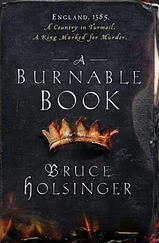Bruce Holsinger - The Invention of Fire
Здесь есть возможность читать онлайн «Bruce Holsinger - The Invention of Fire» — ознакомительный отрывок электронной книги совершенно бесплатно, а после прочтения отрывка купить полную версию. В некоторых случаях можно слушать аудио, скачать через торрент в формате fb2 и присутствует краткое содержание. Год выпуска: 2015, Издательство: HarperCollins, Жанр: Исторический детектив, на английском языке. Описание произведения, (предисловие) а так же отзывы посетителей доступны на портале библиотеки ЛибКат.
- Название:The Invention of Fire
- Автор:
- Издательство:HarperCollins
- Жанр:
- Год:2015
- ISBN:нет данных
- Рейтинг книги:3 / 5. Голосов: 1
-
Избранное:Добавить в избранное
- Отзывы:
-
Ваша оценка:
- 60
- 1
- 2
- 3
- 4
- 5
The Invention of Fire: краткое содержание, описание и аннотация
Предлагаем к чтению аннотацию, описание, краткое содержание или предисловие (зависит от того, что написал сам автор книги «The Invention of Fire»). Если вы не нашли необходимую информацию о книге — напишите в комментариях, мы постараемся отыскать её.
The Invention of Fire — читать онлайн ознакомительный отрывок
Ниже представлен текст книги, разбитый по страницам. Система сохранения места последней прочитанной страницы, позволяет с удобством читать онлайн бесплатно книгу «The Invention of Fire», без необходимости каждый раз заново искать на чём Вы остановились. Поставьте закладку, и сможете в любой момент перейти на страницу, на которой закончили чтение.
Интервал:
Закладка:
The next morning she woke before the sun and stole across the yard, reaching the smithy before any of the apprentices left their shared rooms at the far end of the foundry to start the fires. Once beneath the eaves she pulled over a stool. One foot up, the other on the bench, and with a hand on the lower shelves she hauled herself upright, finding a dangerous balance between stool and bench. She reached up and over, searching blindly with her left hand, first here, then there, then-
There.
Smooth, curved, cold to the touch, and when she brought it before her eyes she could scarcely believe that Marsh had risked those night hours and her own wrath in fashioning such a little nothing-nor that she’d risked her babe and her neck to discover it. The thing could have been a child’s bauble, this light length of metal. It gaped open at one end to show four pronglike teeth, then curled majestically to the side and back, and ended in an extravagant coil of spirals that left just enough room for the easy insertion of a finger or a thumb.
Yet the gadget was more cleverly made than it first appeared. On its underside was a narrow rod, and at the bottom of that a subtle hinge, as if the contraption were meant for attaching to some other, larger device.
Hawisia reached up and returned the object to the upper shelf. She left the smithy more bewildered than angry, and spent the whole of that day puzzling over the nature and use of what she had seen and touched, this sinister thing Stephen Marsh had fashioned in the dark of the moon.
A serpent.
PART II
Chapter 11
Another byway on the road north, another common hostelry, another night with him, and yet the miles of travel, she found, had not weakened but strengthened her. Margery’s arms felt steady and firm at the reins, the muscles in her legs and buttocks were finding new reserves of endurance, and her middle was tightening into a hard circumference of muscle and effort. There were worse things, she supposed, than a week on one of the safer roads, the autumn sun on your face and an October breeze teasing the hair out from beneath your hood, riding it up to curl around your ears, down to whisper against your lips.
Much worse things. Like a hanging, or a season in a cell, or an iron ball in the heart.
He too sat taller on his new horse, the roan mare taken as a replacement from the inn now some days to the south.
Robert Faulk rode well for what he was. She hadn’t told him so, as every time she paid him a kind word his cheeks reddened, and he stammered and hawed in ways she didn’t like. It was true, nonetheless, and she felt silently grateful for the willingness he had shown to adjust. Like a poor orphan given over to a wealthy ward, finding a new way and its unfamiliar patterns.
Unfamiliar patterns. As their company turned for the waiting stableboy, come out to greet them from the inn’s barn, she felt it again. That tightening, a tensing of something deep within her. It had been like this for the last several days, since that Westminster messenger had nearly sent her into a fit. There was no explaining it, really, though she suspected it had little to do with Robert and everything to do with their flight.
Why, who would find it surprising that such a harrowing adventure would lead to new twinges here or there, as her mind and her flesh molded themselves to the stark realities of this unwonted exile from the dreads of her former life? It was only natural that she would feel a slight tingle as this man handed her down to the mounting block, his skin rough and dry on her palm, his eyes respectfully averted from her feminine form, as was proper.
Yet why did this agitate her further? Why was she craving the touch of those eyes, the grip of those callused hands? She pushed away the unclean thoughts and allowed the boy to take her horse.
With their beasts stabled they followed the company into the front eating room. There was no separate chamber for gentles at this less spacious inn, and she found it a relief to mingle with the others, to dine without the close intensity of his singular presence.
It was a diverse array that had set out from the Bethlem Priory, just north of the London walls. Seven men, five women, twelve all told including themselves, and as she sat with the women, listened in on their talk, she learned what had brought them there, what circumstances of life and longing had provoked them to make the long journey to Durham and the holy bones of St. Cuthbert.
Two were sisters, Catherine and Constance. Widows both, husbands years in their graves, and a more accomplished pair of pilgrims would have been hard to find.
Yes, we have been to Jerusalem, they boasted loudly, walked in the footsteps of our Savior Jesu, trod the stations of His Passion, prayed on the hill of Calvary. They had taken in St. James at Compostela along the way, as well as Rome, where they enjoyed an audience with English bishops and a cardinal at the Curia, receiving blessings and pilgrims’ alms from all. Weeks on an old hulk in the great sea, a month in the blood-drying heat of the Holy Land, then home again, and who was to say they wouldn’t attempt the journey again before they died?
“And Canterbury?” someone asked. “Have you made the journey to Becket’s tomb?” There followed an uncomfortable pause, which Constance broke with a light and condescending laugh.
“Why yes, my lovely, we have been to Canterbury once or twice, have we not, Catherine?”
“Oh, twice or thrice, I’d wager, twice or thrice,” said her sister, her eyes sparkling with amusement. “Though never Durham.”
“No, never the Palatinate,” Constance allowed. “So here we are, filling a little gap!”
The next woman, Evota, a pert young wife with a wandering eye and a rich liking for gossip, was traveling with her new husband, “the slight fellow with the yellow face and that lovely lump of suet on his chin,” as she described the poor man and his unfortunate carbuncle. He was yeoman to an Austin canon of Durham, to which they were returning after a sojourn in London to retrieve the inheritance left by her late departed father. “Sixteen pounds, and a silver ring,” she said, holding it up for them. “Tried to leave me his cooking pots as well, though we sold them to the peddler for a few pence rather than haul them along.”
Maud, the fourth, was also young though great with child. “With a bastard, I’ll warrant,” Constance had loudly opined. This seemed to be the case. Her father was a tight-lipped mercer of Queenhithe Ward. The talk was that the pair were bound for Durham to rid the family of the child’s stain.
Margery was the last, and she answered their questions with the same lies and half-truths she had spun in her mind from the beginning. We are from a village on the Sussex coast, up from Brighthelmstone. Our only child, a girl of six days, gone to her grave, and before her mandated baptism. The fever. How to assure her eternal rest, to save her unblessed soul from the fires of purgation?
A pilgrimage, they had decided with the parson. To what shrine? Durham in the Palatinate, he had advised them, and the shrine of St. Cuthbert. For old Cuthbert is the saint of incorruptibility, a reminder of God’s triumph over death. Let this long journey north along the length of all England serve as a pilgrimage of thy soul to sweet Jesu, and soothe thee and the soul of thy babe in the balm of His eternal and undying love.
“So we departed,” she said softly, “our little Alys dead only a fortnight, and it is all my Antony can do to stay on his horse, his heart sits so heavy in that strong chest.” The women all looked over at that strong chest and the ruddy face above it, cooing in sympathy as they imagined the sorrow of this bereft father, pictured the ways he might be comforted.
Читать дальшеИнтервал:
Закладка:
Похожие книги на «The Invention of Fire»
Представляем Вашему вниманию похожие книги на «The Invention of Fire» списком для выбора. Мы отобрали схожую по названию и смыслу литературу в надежде предоставить читателям больше вариантов отыскать новые, интересные, ещё непрочитанные произведения.
Обсуждение, отзывы о книге «The Invention of Fire» и просто собственные мнения читателей. Оставьте ваши комментарии, напишите, что Вы думаете о произведении, его смысле или главных героях. Укажите что конкретно понравилось, а что нет, и почему Вы так считаете.












